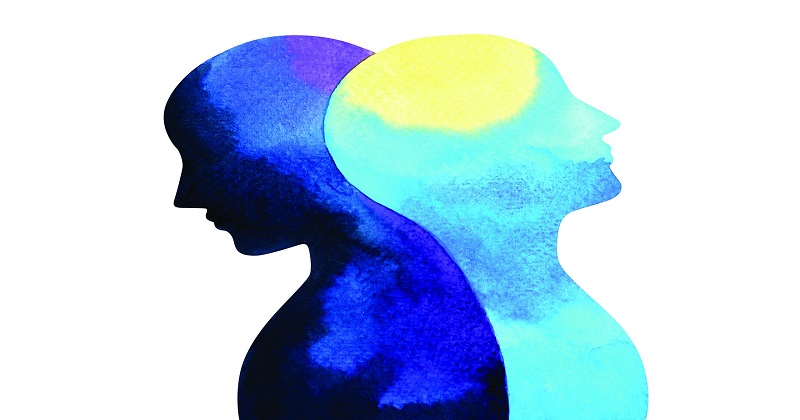
Bipolar disorder is a mood disorder marked by the presence of episodes of significant disturbance in an individual’s mood and activity level. It is marked by the presence of continued mood disturbances. A patient with bipolar disorder can experience a severe depressive episode, mild-moderate depressive episode, hypomania or mania episode, mixed episode and periods of euthymia (period without mood symptoms). The depressive episodes are marked by depressed mood, loss of interest, decreased energy, increased fatigue, inability to concentrate, a decline in self-esteem, loss of confidence and difficulty in decision making changes in sleep and appetite. The manic episodes are marked by the presence of persistently elevated, euphoric and expansive mood, increased levels of energy, inflated self-esteem, decreased need for sleep, distractibility, racing of thoughts, increased talkativeness and overfamiliarity. Suicidal ideation may accompany episodes of both polarities.
Difference between bipolar disorder and other conditions
Bipolar disorder is identified from major depressive disorder by the presence of at least one episode of manic/hypomanic symptoms.
Bipolar disorder differs from mood swings!
Experiencing mood swings or fluctuations is not the same as experiencing bipolar disorder. Bipolar disorder is marked by the presence of episodes of sustained and significant mood disturbances.
This disorder is not
- Random mood fluctuations
- Inability to handle mood swings
- Having a bad temper
- Being unruly
- Throwing tantrums
Causes of this disease:
It has a multifactorial aetiology implying that it is caused by a mixed exchange of multiple factors. It essentially results from the change in the mechanisms that are responsible for the regulation of mood. It involves brain areas like the limbic system, neurotransmitters and endocrine system. Heredity plays an important role in bipolar disorder. Whereas the causal factors might largely be biological the triggering factors can often be psychosocial. Often the first episode of Bipolar disorder is preceded by a stressful event. However, with every relapse with the progression of the disorder the individual becomes more vulnerable to stress. Stressor like loss of a family member, occupational failures, role readjustments or abrupt changes in sleep cycles are often associated with relapse in bipolar disorder.
Treatment options:
Today fortunately there are effective treatment methodologies for bipolar disorder. Multidisciplinary management is vital for the comprehensive treatment of the disorder. Pharmacological interventions are designed for both the acute phase of treatment and the maintenance phase of the treatment. Psychological interventions like interpersonal and social rhythm therapy have proven effective in stabilising the disruption in the circadian rhythms of the patients. The maintenance of biological and social rhythms is essential in the treatment. Patient and caregiver education also plays a vital role in the overall management of the disorder. Strict adherence to medications, early detection of episodes, maintaining regular sleep-wake cycles and following behavioural guidelines can facilitate the prevention of relapse. With individualised care many patients with bipolar disorder are well adjusted and are able to carry out their social, professional, familial and personal roles.

Post Your Comments